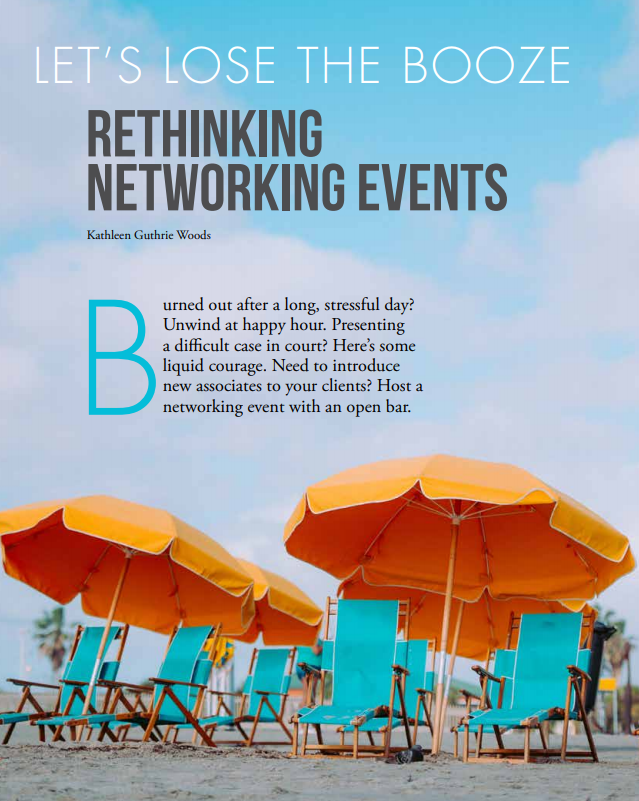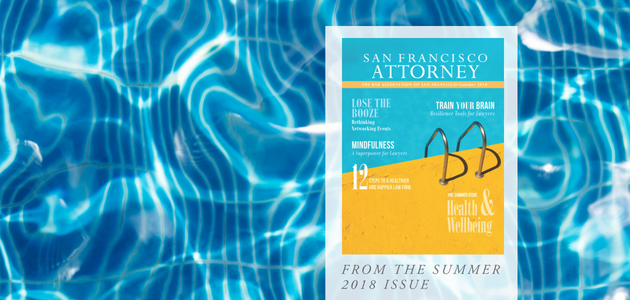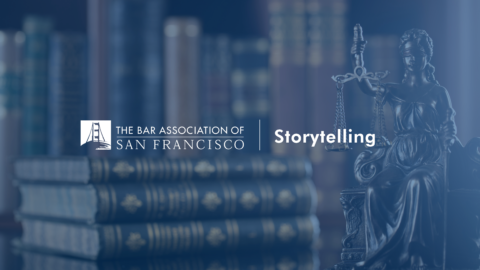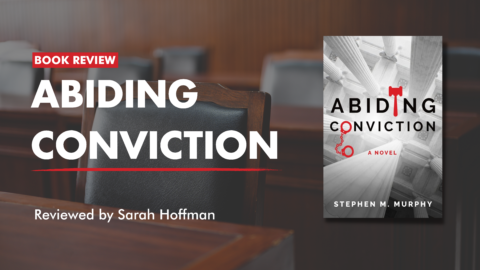
Burned out after a long, stressful day? Unwind at happy hour. Presenting a difficult case in court? Here’s some liquid courage. Need to introduce new associates to your clients? Host a networking event with an open bar.
Alcohol consumption and events built around alcohol are ubiquitous components of the legal profession, but the consequences are far from happy for the lawyers, judges, and law students who suffer from alcoholism. “Every year, we beat out every other profession with the highest rate of drug abuse and alcoholism,” says David Mann, a former criminal defense practitioner who serves as Northern California consultant to The Other Bar, a free and confidential service that offers a hotline and peer support meetings throughout the state. Bar associations and firms have recognized the need for change, with the American Bar Association’s (ABA) National Task Force on Lawyer Well-Being (August 2017) acknowledging the need for social networking events as well as recommending “de-emphasizing alcohol at such events.”
“This is a conversation we need to have,” says Drew Amoroso, CEO of Move Associates and current President of the Bar Association of San Francisco’s (BASF) Barristers Club. “We’re required to take substance abuse courses, but I’m not sure we’re doing enough to get in front of this.”
Under immediate past president Adam Kaplan and Amoroso’s leadership, the Barristers Club board identified things they wanted to focus on, and health and wellness topped the list. Their brainstorming sessions led to their rethinking client-facing and networking events to incorporate outdoor and family-oriented activities. For example, in April of this year, the Justice and Diversity Center (JDC) and the Barristers Club cosponsored the Impala Racing Team’s Stow Lake Stampede 5K in Golden Gate Park, with BASF/JDC staff and members participating as runners and spectators.
“We can come up with ways to connect with other people without having alcohol there,” says Amoroso, whose company helps law firms train their associates and emphasizes the need for creating work-life balance. “Studies come out all the time about the benefits of rest, meditation, and exercise,” he says, so it makes sense that, in our efforts to take better care of our physical and emotional well-being, we’re also considering if it’s time to lose the booze from our social events.
 Attorneys and Alcoholism
Attorneys and Alcoholism
Alcohol is used as a social stimulus—making it easier to bond with people or for celebrating an occasion—and as a sedative to numb the anxiety inherent in the legal profession. “There are weird things about practicing law,” says Mann, who has been clean and sober since 1998 and teaches an MCLE class on substance abuse. Attorneys he’s talked to mention things like the pressure to succeed and the adversarial nature of the work that drives students and practicing attorneys to abuse performance-enhancing substances. “I hear ‘I started cocaine to write a brief and had a deadline’, or ‘I took Valium because I was nervous about appearing in court and I needed to calm down,’” he says. “If you spend all day doing work you find meaningless, or that doesn’t comport with your values, you feel crappy about yourself and want to turn your brain off, so you go home and have a triple scotch.”
It’s easy to argue that the cultures in other professions are also high-stress, and they too host social events fueled by alcohol. Go to any industry conference, flip over your name tag, and you’re likely to find drink tickets tucked into the plastic sleeve. What’s different, says Mann, is that “we have more alcoholism.” The statistics are staggering. Results from a national study published in 2016* indicated that 21 to 36 percent of then-currently employed attorneys “drink at levels consistent with alcohol use disorder.” That percentage was three to five times higher than the occurrence in the general population. [To learn more about this, read “Substance Abuse: It Can (and Does) Happen to the Best of Us” by Leslie A. Gordon in San Francisco Attorney (Fall 2016)].
The pressure starts in law school. The ABA’s 2016 National Task Force on Lawyer Well-Being discovered 25 percent of surveyed law students were at risk for alcoholism. “When I was a summer intern at big firms in the 1980s,” says Mann, “at lunch we had three drinks. It was if they wanted to see how we’d handle our booze and still get work done.”
What makes lawyers more prone to alcoholism? “For a lot of lawyers, problems developed long before they became attorneys,” Mann says. “We are predisposed by personality to be susceptible.” He references the 2004 book Lawyer, Know Thyself: A Psychological Analysis of Personality Strengths and Weaknesses by Susan Swaim Daicoff. “The personality traits of attorneys—ego-driven, controlling, highly intelligent, competitive, pessimistic—are identical to alcoholics,” says Mann. So the same characteristics of people who are attracted to the legal profession, the theory goes, also puts them at risk for what Daicoff calls the “tripartite crisis” of professionalism, public opinion, and lawyer dissatisfaction and dysfunction.
Yet denial reigns. “I’ll never forget my very first networking/CLE event as an attorney,” says Omar Parra, an attorney at Haight Brown & Bonesteel. “It was on substance abuse—and there was an open bar.”
Parra currently serves on the Executive Committee of the Barristers Club’s Litigation Section. He helps plan CLEs, and the topics they are developing include encouraging mindfulness and mental wellness. They are also exploring alternatives to typical networking and social events.
Planning Alcohol-Free Events

While the move toward alcohol-free events isn’t yet a trend, Paige Buck, a partner at San Francisco–based Kennedy Events, says, “I think the industry has some catching up to do with this challenge.” Maggie Spicer, founder and director of Whisk, a San Francisco–based events and experience agency, notes that many of their tech clients have booze available at happy hours held in the office, therefore “alcohol is not as much of a draw when they come to us for events,” she says. Furthermore, “alcohol doesn’t necessarily build lasting bonds.”
Both women shared success stories from alcohol-free events their firms created recently. “One of our most popular events is a match-making luncheon,” says Buck. “We have a junior associate sit down with a partner or general counsel.” Spicer’s agency has developed classes and workshops where guests can mingle while learning chocolate truffle-making, screen printing, pickling, or magic tricks. “This was intentional,” she says, “to get team members bonding over shared values and interests, rather than through the loosening effects of alcohol.”
Breakfast and lunch-time events, typically sans alcohol, are also popular, and planners are getting more creative about how they break the ice and encourage bonding. For one breakfast, Spicer’s team asked guests to respond in advance to the following: Night owl or early bird? Bar soap or shower gel? Dinner leftovers for breakfast, yes or no? Attendees’ nametags included their preferences, says Spicer, which “helped folks to loosen up first thing in the morning without having to ask people about what they do for work or where they work.”
Fitness enthusiasts tout the benefits of combining active lifestyles with their networking. “A unique aspect of running with people is it’s not a solo endeavor,” says Jennifer Redmond, a member of BASF’s Board of Directors and member of the Impala Racing Team. “You spend a tremendous amount of time with them, maybe running ten miles or driving to and from a race. It tends to promote intimacy and also exposes you to people outside of your circle.” A partner at Sheppard Mullin, she mentions having recently been introduced to a new client and discovering they were both runners. “It creates a bond you wouldn’t otherwise have.”
David Reidy, a partner at McGuireWoods and member of JDC’s Board of Directors, found a similar dynamic in cycling. “There’s a ride for every cause,” he says, “and it’s a great way to support a good cause and to network.” McGuireWoods has supported a ride benefiting a foundation for the past several years, an event Reidy says also engages family members. “Some rode bikes, some volunteered,” says Reidy. “It’s a great way to socialize and meet new people.”
Back at the office, there’s more employers can do as well. “Emphasize and teach wellness on a day-to-day basis,” says Amoroso. He suggests encouraging interactions around step challenges (utilizing Fitbit trackers), walking meetings, lunches outside, or starting a breakfast meeting with a led meditation.
Individuals can also move toward wellness and away from alcohol temptations with small changes. “If someone asks, ‘Let’s get a drink,’” Buck suggests, “reply with, ‘How about we meet for coffee?’”
 BASF is Leading by Example
BASF is Leading by Example
“It’s important that we lead by example,” says Parra, and there are a number of events on BASF and JDC’s calendar that focus on bringing attorneys together for networking, family fun, and sports.
On July 14, the 11th annual Ride for Justice bike-a-thon will raise funds to support the legal services program of JDC. Individual cyclists, some riding with teams, head over the Golden Gate Bridge and out to Marin via a 12.5-mile route or join Team Tam for a rigorous 30-mile loop that climbs Mt. Tam. Family members, friends, and other non-cyclists may choose to participate in a 1.5-mile walk-a-thon around Crissy Field and the Marina Green. “Bring the kids and hang out!” says Reidy, a recreational rider who brought his riding group to the 2017 event and looks forward this year’s event. “The emphasis,” he says, “is raising money and getting out there. It’s not competitive.”
If basketball is your sport, plan to participate in the second annual Hooplaw Tournament, scheduled for August 19.
A side benefit of moving events out of the bar is favorable visibility. Shepherd Mullin participated one year in San Francisco’s Pride Parade. “T-shirts were made, and clients were into it,” Redmond says. For the 2018 Stow Lake Stampede, Steve Love, JDC’s Director of Donor and Community Engagement, and the Barristers worked with immigration staff to set up an information table. “A lot of our members are interested in immigration issues, so this was a way to bring the message to a broader community,” says Redmond. “It was a win-win for everybody.”
Win-win. That’s what we are hoping for in our efforts to rethink networking. By being aware of and planning events for our audience, by being mindful and offering alternatives to alcohol-focused events, and most important, by encouraging others to seek help for problem use, the legal profession will be the better for it.
Kathleen Guthrie Woods and her husband are training to participate in this year’s Ride for Justice. Come ride with us!
* See “The Prevalence of Substance Abuse and Other Mental Health Concerns Among American Attorneys” by Peter R. Krill, Ryan Johnson, and Linda Albert, Journal of Addiction Medicine January/February
If you need help with alcoholism, drug abuse, and related personal problems, The Other Bar is open to all California lawyers, judges, and law students. Services are free and are provided in strict confidentiality. Call 800-222-0767 (24 hours a day) or visit otherbar.org.




